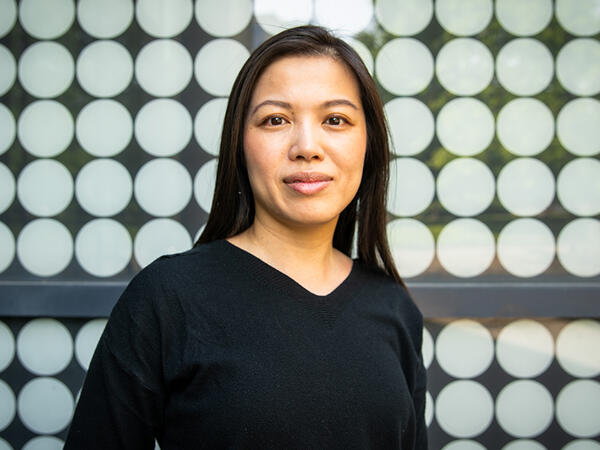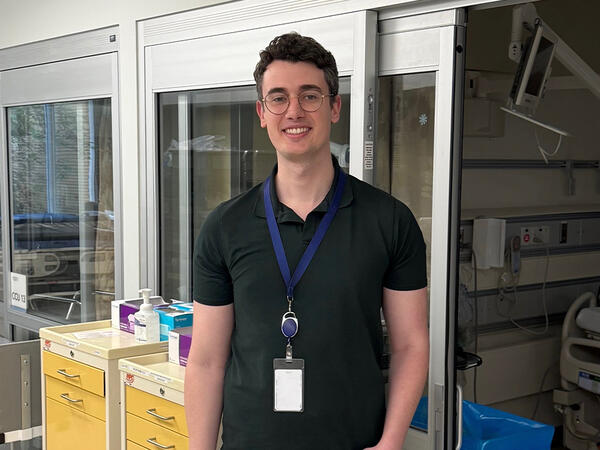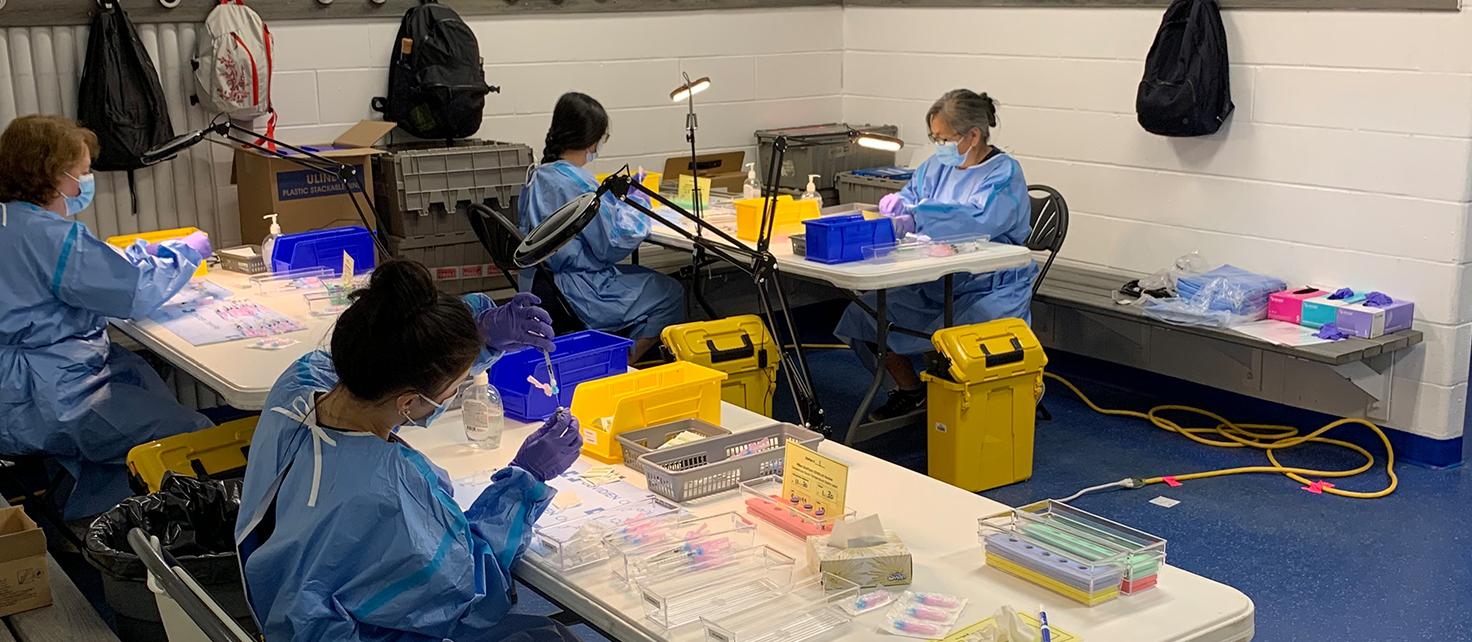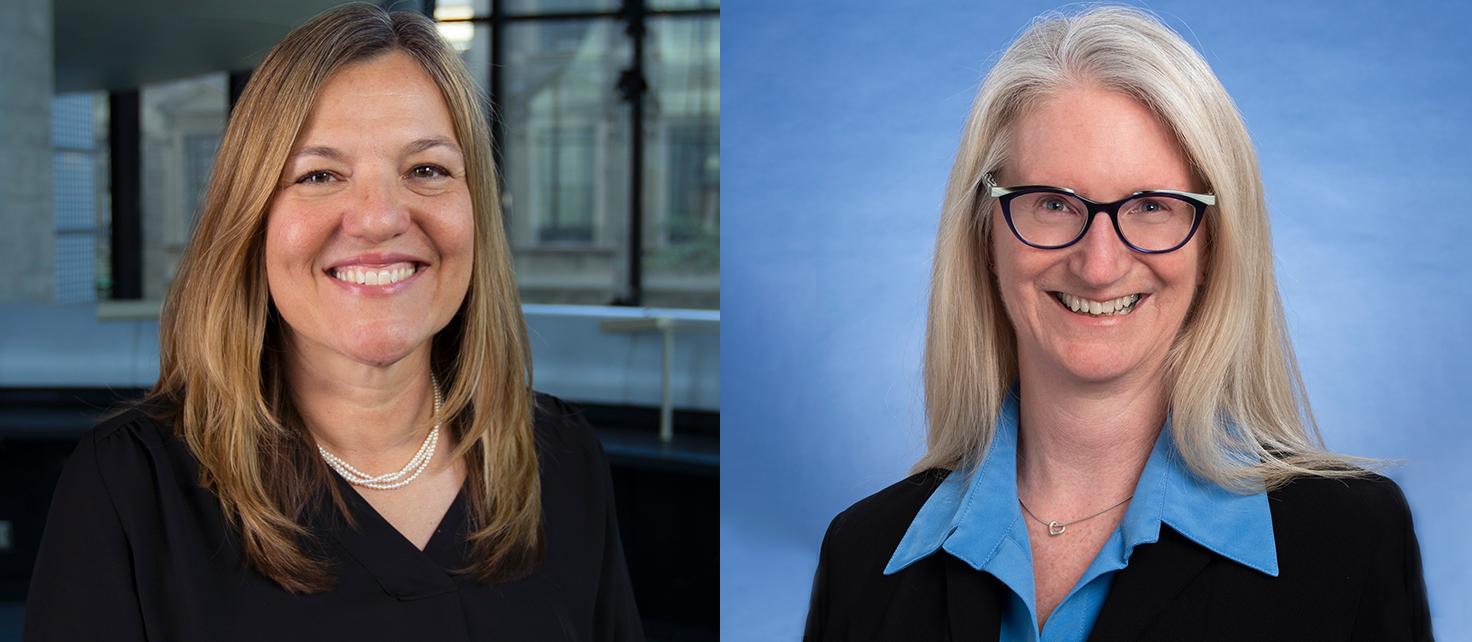Pharmacists prepare COVID-19 vaccine doses at an Etobicoke pop-up vaccine clinic.
Linda Dresser and Sandra Bjelajac Mejia receive COVID-19 Vaccine Clinic Research Springboard Funding to improve vaccine delivery and uptake
Two assistant professors at U of T’s Leslie Dan Faculty of Pharmacy have been awarded new funding to examine different COVID-19 vaccine delivery efforts. Linda Dresser, assistant professor (status), and Sandra Bjelajac Mejia, assistant professor (teaching stream), are two of the five recipients of the COVID-19 Vaccine Clinic Research Springboard Funding, a new grant through U of T’s Council of Health Sciences (CHS). Funding through the CHS is intended to promote cross disciplinary initiatives.
“This is an exciting initiative for the University’s Council of Health Sciences and an ideal opportunity to further develop interdisciplinary approaches to accelerate high impact research,” says Linda Johnston, dean of the Lawrence S. Bloomberg Faculty of Nursing and chair of CHS at the time funding was approved.
“These research grants acknowledge the critically important contributions of the health professions at the University of Toronto and the successful rollout of Toronto’s vaccination strategy.”
As COVID-19 vaccination efforts gained momentum in the spring and summer, the CHS launched the funding to support new research focused on COVID-19 vaccine delivery and uptake. Four faculties – the Leslie Dan Faculty of Pharmacy, Temerty Faculty of Medicine, Lawrence S. Bloomberg Faculty of Nursing and Dalla Lana School of Public Health – each contributed funds to the award pool.
The Leslie Dan Faculty of Pharmacy’s Centre for Practice Excellence (CPE) played a key role in managing the grant application, review and administration, thanks to its visibility in the U of T community and its experience in leading various events and award applications that include calls for proposals.
Five projects, each highlighting a different aspect of vaccine delivery, received the one-year, $15,000 awards, with the goal that this early research will generate results that can be used as a launching point for larger grants. The projects include a remarkable degree of collaboration across health science faculties and involve a tremendous number of external stakeholders with wide-ranging interests in supporting COVID-19 vaccinations and improving public health.
“These short, relatively small projects lend themselves to high impact, short turnaround research and practice excellence,” says Annalise Mathers, research officer with the CPE. “One of the things we’ve learned throughout the pandemic is that that we really need quick turnaround efforts that show impact and results quickly.”
Assistant Professor (Teaching Stream) Sandra Bjelajac Mejia and Assistant Professor (Status) Linda Dresser
Pharmacy-led projects aim to build capacity for future vaccination efforts
The two pharmacy-led projects highlight the important role that pharmacists have played in vaccine delivery and aim to build capacity for future vaccination efforts.
Mejia and her team will develop and evaluate a student-led COVID-19 vaccination program and educational initiative at the U of T. Under the supervision of preceptors, students in various health sciences disciplines will learn all steps in the vaccination process, from equity-informed outreach activities to handling of the medication to administration and post-vaccine follow-up. The research team will evaluate the initiative, including barriers and facilitators, the students’ readiness to lead such a program, and the strategies and resources required to improve the program.
Dresser, who is also pharmacy director of the U of T and UHN static and pop-up vaccination clinics, will develop a “playbook” of best practices for pharmacy teams to deliver vaccines in a pop-up setting. As pharmacy teams have been essential in mass vaccination clinics and smaller pop-up sites, the lessons they have learned could improve vaccination efforts, both for COVID-19 vaccinations and other vaccines. Dresser’s team will survey pharmacy team members and assess the approaches they used to identify best practices for delivering vaccines in short time frames and with low costs.
“Both of these awards represent the really exciting work coming out of the Faculty,” says Mathers. “Their success speaks to the momentum pushing forward the profession of pharmacy and the expertise that pharmacists bring to vaccination efforts in a pandemic or non-pandemic setting.”
Three public health researchers also awarded funding
In addition to Dresser’s and Mejia’s proposals, three projects led by researchers from the Dalla Lana School of Public Health were also successful.
Neil Seeman, senior fellow at the Institute of Health Policy, Management and Evaluation – along with a multidisciplinary team representing primary care, long-term care, vaccine clinic operations and investigative journalism – is examining the private, “taboo” reasons that some people express for wanting to be vaccinated. The team’s goal is to identify these motivators and work with public health and community organizations to apply them to new public health messages that optimize vaccine uptake.
Daniel Buchman, assistant professor, is exploring the beliefs and attitudes of youth with mental illness toward COVID-19 vaccines and how they search for and receive information about these vaccines. The results will help create public health and vaccine campaigns and clinical tools to increase vaccine uptake in this vulnerable, yet often hesitant, group.
Monica Aggarwal, assistant professor, is examining the barriers to and facilitators of implementing COVID-19 vaccine programs led by primary care providers in eight countries. The lessons learned will inform an evidence-based vaccine rollout strategy through primary care during the COVID-19 pandemic and beyond.
More News
Image

Welcoming Ivy Lam as Academic Lead in Climate, Health & Sustainable Care
Assistant Professor Lam will guide the Leslie Dan Faculty of Pharmacy's efforts to embed environmental sustainability across the Faculty.
Read More
Image

Pharmacy alum’s research shows how full-scope practice improves cancer care
Honoured with a national award, Adrian de Boer says his residency experience was a powerful reminder that he's making a meaningful change to the pharmacy profession.
Read More
Image

Pharmacy alum passionate about helping community pharmacists practice to full scope
As a pharmacy leader at Rexall, Heidi Wittke uses frontline experience to lead initiatives that improve patient care
Read More

